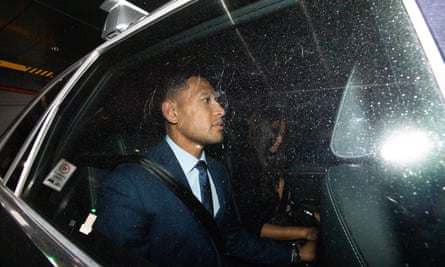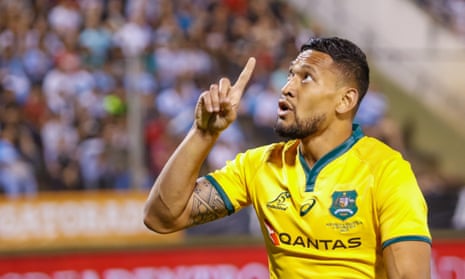Australian rugby is facing an unprecedented moment of reckoning after star fullback Israel Folau posted a warning on Instagram that “hell awaits” homosexual people.
The divisive post from one of the country’s best rugby players has blighted preparations for the Wallabies’ World Cup campaign, exposed fault lines within the dressing room, and has been the flashpoint for a national conversation about freedom of speech and bigotry, even prompting a question in the leaders’ debate ahead of this week’s federal election.
The national drama, which looks set to drag on for months, centres on Folau, 30, a preternaturally talented player, who has competed in three codes of football in Australia: rugby league, Australian rules and rugby union. He made his international union debut for the Wallabies against the British and Irish Lions in 2013 and has since become the fourth highest try scoring Australian international player and has won the John Eales medal – Australian rugby’s top prize – a record three times. In February, he signed a $4m, four-year contract with Rugby Australia.
But just before Easter his rise abruptly faltered. On 10 April, Folau, a devout Christian, posted on Instagram that “hell awaits” for “drunks, homosexuals, adulterers, liars, fornicators, thieves, atheists, idolators”.
It was not the first time Folau had caused outrage for comments about gay people. Last year, he was asked in the comments of an Instagram post what he thought God’s “plan for homosexuals” was, to which he replied: “Hell… unless they repent of their sins and turn to God.”
The latest post appeared to be the final straw for Rugby Australia, which announced its intention to tear up Folau’s contract. The player challenged that decision at a code of conduct hearing.
During the week, a three-person independent panel found Folau guilty of a “high-level” breach of Rugby Australia’s commitment to inclusiveness. Folau, who reportedly rejected a $1m offer to walk away from Australian rugby before the hearing, has refused to back down from the comments, with his legal team saying he was merely quoting the Bible and has a right to express his faith.
‘Might as well sack me’
Among the questions now facing Rugby Australia is how divisive this issue will prove in the dressing room, as it becomes clear there are starkly different views among the team. While some players have condemned Folau, there are a significant number of players in the side of Pacific Islander background, many of whom share the conservative Christian views held by Folau, who is of Tongan descent.
After the incident, Folau’s Wallabies teammate Taniela Toupou posted on Facebook: “Seriously ... Might as well sack me and all the other Pacific Islands rugby players around the world because we have the same Christian beliefs.”
The panel is now deliberating on whether that constitutes cause for the termination of his employment. A decision is expected next week.
His comments have led to Folau being dropped by sponsors Asics – Land Rover has also taken a car off him – and prompted condemnation from current and former players, including Test captain Michael Hooper and Wallabies coach Michael Cheika, who said he would find it “difficult” to pick Folau for Australia again.

Rugby league legend Ian Roberts, who was the first elite rugby league player in the world to come out as gay, said the comments were particularly harmful because “there are literally [gay] kids in the suburbs killing themselves … [they’re] confused, not knowing how to deal with it, these type of remarks ... can and do push people over the edge.”
After his 2018 post, Folau wrote that the idea he was homophobic “could not be further from the truth. I fronted the cover of the Star Observer magazine to show my support for the Bingham Cup, which is an international gay rugby competition for both men and women. I believe in inclusion. In my heart, I know I do not have any phobia towards anyone.”
After this latest incident, Folau spoke at his church on 12 May and said he had been tempted to take a deal from Rugby Australia that would allow him to resume playing, but refused it because “it is always the will of God that comes first”.
Faith and freedom of speech
Folau’s suspension and the ongoing hearing has made front page news in Australia, causing a national debate around freedom of speech, freedom of religion and bigotry.
Prime minister Scott Morrison, who belongs to the same Pentecostal denomination as Folau – Assemblies of God – expressed support for him last year after the first post made headlines, saying: “It clearly means a lot to Izzy and good for him for standing up for his faith.”
Morrison’s response to this year’s furore has been more muted. When questioned about Folau’s case at the final leaders’ debate this week, the prime minister said: “Freedom of speech is important but we have to exercise it responsibly and exercise it in a society such as ours with civility and due care and consideration to others.”
The Wallabies, who were never going to be favourites to win it, now face the prospect of entering the upcoming World Cup in Japan a divided team, without their star player, and having gone through the months leading up to the tournament with attention focused not on strategy and training, but Folau’s comments.
Whatever the result, the saga is set to drag on for months, with both Folau and Rugby Australia having the right to appeal against any decision to come out of the code of conduct hearing. But the impact on the Wallabies and Australian rugby will likely be felt for a long time.
